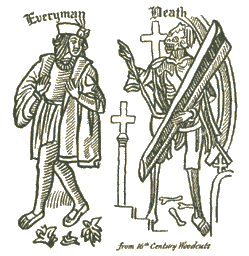
“On thee must take a long journay. . .” (Death speaking to Everyman)
Written at the end of the fifteenth century, the morality play Everyman displays the universal moral struggle. The first morality play to be printed on the printing press, Everyman is also the most medieval play that is available, (“Everyman Historical Context”). One out of the seven surviving morality plays of the time, it utilizes all the main components of its genre in order to teach a clear lesson. This includes a protagonist representative of humanity as a whole, supporting characters personifying good or evil, and an alignment of the characters and their foils. The play makes a final point that while material possessions may seem important, they are not going provide meaning or assistance in the end. Death is ultimately seen as something that must be experienced alone, but a redemption narrative is possible before the final judgement as Everyman proves. Around nine hundred lines and with four surviving versions, Everyman is the ideal model for a tragic morality play.

The allegorical Everyman also allows for a deeper look at the concept of Ars moriendi in a medieval drama. An interest of the best possible ways to die is important not only of the time, but also can be seen throughout this play. It highlights the decisions that must be made to gain back some control when facing death. In looking at the issue of community versus individuality, very quickly every aspect of Everyman’s life he thought to be important, start to abandon him just when he needs them the most. The characters Beauty, Fellowship, Kindred, Cousin, and Goods all deny him, even when he begs them to go on his journey with him. He gets what he neglected in life, Good Deeds, to come with him. This is the factor that ultimately grants him salvation. So, the Christian view of death cements the fact that the best way to prepare for death is by being charitable. Everyman is not saved by his family, his friends, his beauty, nor his possessions. He is saved by his good deeds. To fulfill God’s will, one must have to complete service for others. The difference between Protestantism and Christianity, is that you can repent and still be saved in Christianity, regardless of the present sin. This is how it plays out for Everyman, showing that forgiveness is always present in Ars moriendi.

https://images.app.goo.gl/2NBfi1c3ymzmn8Bg7
“Now hath he suffered that we all shall endure, The Good Deeds shall make all sure. Now hath he made ending, Methinketh that I hear angels sing, And make great joy and melody, Where Everyman’s soul shall be,” (Greenblatt 579).
Everyman ultimately receives this salvation because of the ways he tried to be Christlike at the end of his life. He showed forgiveness and followed the ways of the Ars moriendi, and was saved. Even though he is portrayed as not having the right priorities during his life, even in the end there is a second chance. Everyman is shown as successfully fulfilling the steps of the Ars Moriendi.
Works Cited
“Everyman Historical Context.” BookRags, BookRags, www.bookrags.com/studyguide-everyman/historicalcontext.html#gsc.tab=0.
Greenblatt, Stephen, et al. The Norton Anthology of English Literature. W.W. Norton, 2018.